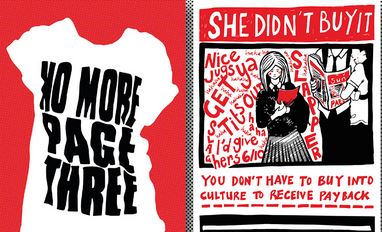Published: 23 January 2015
Country: UK

 British tabloid the Sun mislead its audience to believe that would drop its controversial Page 3 that became a symbol of objectification of women in modern press. The tabloid stopped publishing the images of topless girls for several days and even its fellow News UK paper, the Times, reported on it. Then in a cynical manner it published the ‘Corrections and Clarifications’ under the photo of a topless girl.
British tabloid the Sun mislead its audience to believe that would drop its controversial Page 3 that became a symbol of objectification of women in modern press. The tabloid stopped publishing the images of topless girls for several days and even its fellow News UK paper, the Times, reported on it. Then in a cynical manner it published the ‘Corrections and Clarifications’ under the photo of a topless girl.
The fact that the editors of the Sun did not consider changing the 45-years long history of humiliation of women, but played a game with the audience and misleading it instead, shows their ignorance and out-of-date logic. Even more, it shows what they think of women. ‘Unprincipled manoeuvring by the tabloid reflects the backlash against women who demand equality,’ reports the Guardian. But the tabloid will eventually see the backlash itself. They must ‘join the 21st century,’ concludes Roy Greenslade in the Guardian.
‘The will-they-won’t-they Page 3/page 3 dichotomy does present Sun readers with a mixed message. If the paper genuinely believes that it’s no longer appropriate to publish pictures of bare-breasted women staring at the camera every day, then why carry them occasionally?
On the other hand, if it believes that it is still appropriate, then why stop doing it? It is proof that the Sun is still on the Page 3 hook and therefore still occupying, as campaigners would have it, the high immoral ground,’ writes Greenslade.
Another columnist Simon Usborne wrote for the Independent: ‘Part of me admires The Sun’s balls (chance’d be a fine thing) but I’m not laughing, as much as I like laughing, and you don’t have to be humourless to be depressed by all of this. Because this isn’t about getting one over on those harping campaigners, or sticking two fingers up at sneering Twitter liberals. It’s not about press freedom or left and right. Behind the banter and posturing, it’s still about women’.
Not only the women who are still fighting for equality at workplace, media, family and modern society, but the public as such would not tolerate to be mocked and kept in the past. There has been a change in the habits, needs, expectations and perceptions since 1970 when the Sun started the Page 3 feature.
‘It was when Page 3 started, when you couldn’t get to see such naughtiness anywhere else but a top-shelf mag and readers were thrilled to find it free with their newspaper – but now there are hacked nude photos of A-listers all over the net, and garage mechanics aren’t allowed to stick the page to the wall any more for fear of offending female customers, the commercial advantage has all but drained away,’ writes Gaby Hinsliff.
The tabloid has to acknowledge the facts and the change of circumstances.
In the meantime, it is not hard to imagine that the audience will turn its back on those who dared to play a dangerous power game by humiliating women, misleading the readers and laughing at the campaigners against Page 3. Should the tabloid’s editors be reminded that he, who laughs the last, laughs best? And SHE who laughs the last laughs even better.